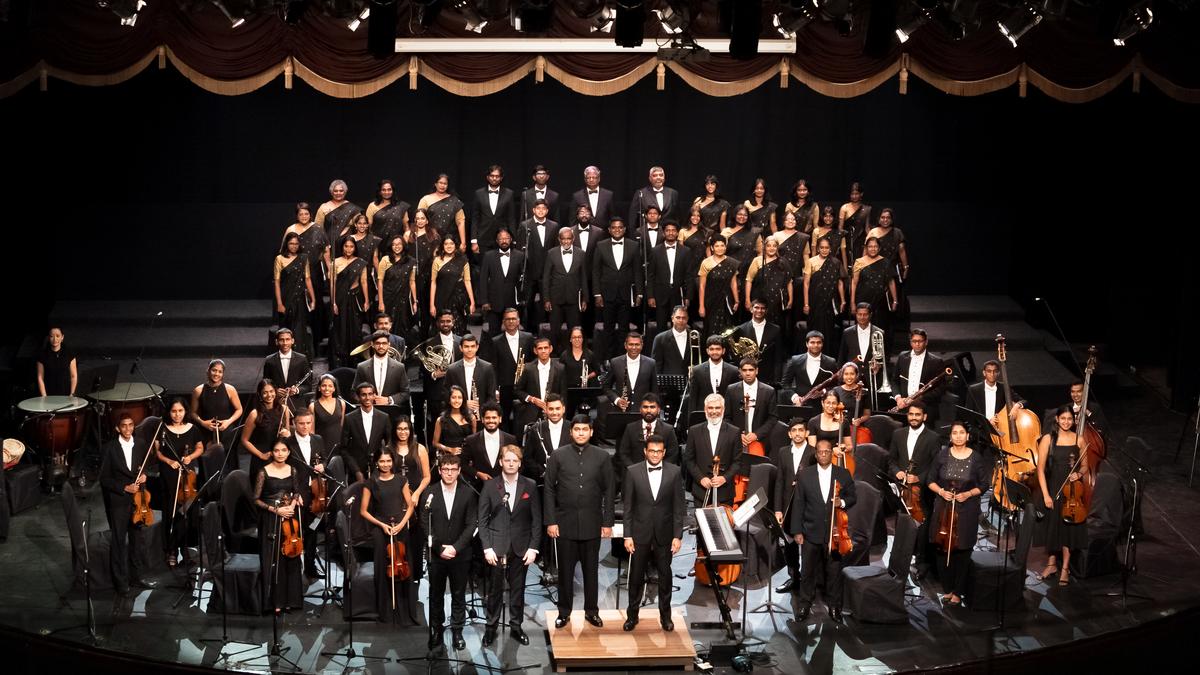
Recreating Haydn’s masterpiece ‘The Creation’
The Hindu
MGPA collaborates with a Sri Lankan choir to premiere Haydn’s ‘The Creation’ in Chennai
The Indian premiere of F.J. Haydn’s ‘The Creation’, presented by the Madras Guild of Performing Arts (MGPA), in collaboration with the Gustav Mahler Society of Colombo (GMSC), promised an evening that would transport the audience to the realms of divine artistry. This was the first international tour of GMSC.
Inside the Sir Mutha Venkatasubba Rao Concert Hall, a sanctuary of sound and light, anticipation crackled in the air. The excited whispers of the attendees, a blend of seasoned aficionados and curious newcomers, created a harmonious prelude to the night’s performance. It took them through Haydn’s masterful depiction of creation inspired by the Book of Genesis from the Bible and John Milton’s Paradise Lost.
At the helm of this ambitious endeavour was Atul Jacob Isaac, the conductor of the MGPA, whose vision and passion brought Haydn’s masterpiece to life.“I had the privilege of studying and learning the Viennese style of conducting and interpreting composers of this particular century,” Issac shared. “I was excited and honoured to apply that in practise with a choir I led and with an orchestra of a very grounded musical foundation, both in management and skill.”
The performance began with The Representation of Chaos, a soundscape capturing the universe’s nascent tremors.The orchestra painted a vivid tapestry where each instrument contributed to the cosmic dialogue. Strings murmured, brass roared, and woodwinds danced, each note a masterful stroke on Haydn’s expansive canvas.
The transition from C Minor to C Major on the word “light” was a moment of sheer brilliance, as the full ensemble played together for the first time. “Theatrically, I had the lights at 70 percent at the start of this piece and when the choir sang ‘And there was light,’ the stage was fully lit,” said Issac.
Kristina Ammattil, the distinguished soprano, embodied the roles of Gabriel and Eve with grace and power. Tenor Ramon Branch Biescas, as Uriel, infused his performance with clarity and emotion, while the performance of baritone Maximilian Catalano, portraying Raphael and Adam, resonated with depth and authority. Their performances brought the characters to life, weaving a narrative rich with drama and beauty.
In a moment of cultural fusion, the encore piece, Danno Budunge, added a breathtaking finale. This famous Sri Lankan song, celebrating the glory of Anuradhapura, was composed by Pt Visvanath Lauji, an Indian musician with a deep love for Western classical music. The orchestral arrangement by Manilal Weerakoon enhanced the song’s grandeur, marking a perfect union of Sri Lankan, Indian and Western influences. It was a fitting tribute to the shared heritage and musical bonds between the nations.

Veteran actor Mukesh Khanna isn’t down with the casting of Ranbir Kapoor as Lord Ram in Nitesh Tiwari’s upcoming two-part adaptation of the Indian epic. Khanna, prone to controversies, argued that the casting of Lord Ram should be synchronous with the actor’s real-life personality, and that Ranbir Kapoor, coming off the success of ‘Animal’, doesn’t fit the bill










